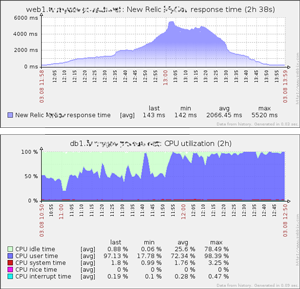In the world of web servers, NginX has emerged as a robust, high-performance option, powering some of the most trafficked sites on the internet. It’s praised for its scalability and its myriad of features, which allow for fine-tuned optimization. One such feature is the sendfile directive, a parameter within NginX’s configuration that can significantly affect… Read more »
What is CPU Steal Time Under Linux, How To Measure it, And How To Keep Your Cloud Provider Honest!
Monday, July 10, 2023
What is CPU Steal Time? In Linux, CPU steal time refers to the amount of time a virtual CPU waits for a real CPU while the hypervisor is servicing another virtual processor. This measurement is often seen in virtualized environments like AWS, Azure, or Google Cloud. In simpler terms, ‘steal time’ is time that a… Read more »
FreeBSD vs OpenBSD: Which is Right for You?
Wednesday, March 23, 2022
FreeBSD vs OpenBSD: Which is Right for You? FreeBSD vs OpenBSD. Which is more secure? Which is faster? Which is generally superior? Both have their strengths and weaknesses, and both appeal to different audiences depending on needs. Our open-source experts sat down to cover some of the major differences between these two platforms in order… Read more »
FreeBSD vs Linux: Which Open Source OS is Superior?
Wednesday, September 1, 2021
FreeBSD vs Linux: Which Open Source OS is Superior? FreeBSD vs Linux, which is superior? The answer isn’t so simple. Both have their strengths and weaknesses and the solution isn’t one-size-fits-all. Our experts at A-Team Systems have decades of experience working with both. So, we’re going to lay out the advantages and disadvantages to help… Read more »
Dedicated and Cloud Hosting Comparison: AWS, Azure, Google Cloud, Vultr, LiquidWeb
Sunday, September 6, 2020
A-Team Systems works with dozens of different hosting providers in almost every environment conceivable. In a unique way this broad experience has given our engineers an inherent “gut feeling” on the performance of these providers and how they compare to each other. The primary goal of this benchmark and hosting review is to replace that… Read more »
SSH Pipe Speed 48 KB/sec FreeBSD 12 PF
Monday, February 24, 2020
We recently ran into an issue after upgrading a server from FreeBSD 11.2 to 12.1 where throughput via SSH pipes would crash to 48 KB/sec almost instantly after starting. The odd thing was scp (which uses SSH) was not affected. After ruling out Internet and remote host issues we discovered that the PF rule was… Read more »
FreeBSD Hardware RAID vs. GMIRROR vs. ZFS
Thursday, September 3, 2015
The ultimate storage shootout! With years of building and testing servers in various configurations we have always suspected hardware RAID was not all that it’s cracked up to be. FreeBSD’s GMIRROR and ZFS are great, but up until now it’s been a gut feeling combined with anecdotal evidence. Today, we change that. The Test Setup… Read more »
New Relic Monitoring & Integration
Friday, August 7, 2015
Today A-Team Systems formally announces the latest edition to all maintenance and monitoring plans: Complete integration with New Relic application monitoring and metrics. We’re particularly excited about this as New Relic is the standard for application monitoring and is an excellent tool for driving optimization of code, database and systems infrastructure. Unified Monitoring Foremost A-Team… Read more »
When To Switch From Cloud Servers to Dedicated Servers
Monday, March 16, 2015
Cloud servers provide a turn key solution to a lot of problems, however they can quickly become an expensive crutch that hides problems rather than solving them. A lot of companies start out with one or two cloud servers then increase resources on them or provision more as their product grows. Quickly this can turn… Read more »
Using powerd(8) To Increase FreeBSD Performance By Over 10%
Wednesday, November 21, 2012
Modern Intel CPUs employ a technology called TurboBoost which works in conjunction with Intel’s SpeedStep technology to temporarily overclock specific cores (sometimes at over 2x the advertised speed) when thermal and power limits allow. SpeedStep is the selective and rapid slowing down, idling and possibly even sleeping of cores which are not being used or… Read more »



